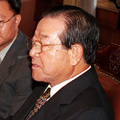2000 South Korean legislative election
| |||||||||||||||||||||||||||||||||||||||||||||
All 273 seats in the National Assembly 137 seats needed for a majority | |||||||||||||||||||||||||||||||||||||||||||||
|---|---|---|---|---|---|---|---|---|---|---|---|---|---|---|---|---|---|---|---|---|---|---|---|---|---|---|---|---|---|---|---|---|---|---|---|---|---|---|---|---|---|---|---|---|---|
| Turnout | 57.2% ( | ||||||||||||||||||||||||||||||||||||||||||||
| |||||||||||||||||||||||||||||||||||||||||||||
 ■ GNP ■ MDP ■ ULD ■ DPP ■ NKPH ■ Others | |||||||||||||||||||||||||||||||||||||||||||||
| This article is part of a series on |
 |
|---|
|
|
Legislative elections were held in South Korea on 13 April 2000.[1]
Opinion polls suggested that the ruling Democratic Party would win the most seats, but the result was a victory for the conservative Grand National Party (GNP), which won 133 of the 273 seats in the National Assembly. The United Liberal Democrats (ULD) lost two-thirds of their seats due to GNP's victory in Gyeongsangbuk-do, Gangwon-do (South Korea), and also fewer local votes in Chungcheong.
With no party winning a majority, the 16th parliament was the first Hung Parliament in South Korean history.[2]
The Democrats, ULD and Democratic People's Party (DPP) formed a coalition to gain a majority. However, the ULD withdrew support in 2001 and joined the conservative opposition. Seven ULD members subsequently defected from the party and joined the GNP, giving it a majority.
Results
| Party | Votes | % | Seats | ||||
|---|---|---|---|---|---|---|---|
| FPTP | PR | Total | +/– | ||||
| bgcolor="Template:Grand National Party/meta/color" | | Grand National Party | 7,365,359 | 39.0 | 112 | 21 | 133 | –21 |
| bgcolor="Template:Democratic Party (South Korea, 2005)/meta/color" | | Millennium Democratic Party | 6,780,625 | 35.9 | 96 | 19 | 115 | +36 |
| bgcolor="Template:United Liberal Democrats/meta/color" | | United Liberal Democrats | 1,859,331 | 9.8 | 12 | 5 | 17 | –33 |
| Democratic People's Party | 695,423 | 3.7 | 1 | 1 | 2 | New | |
| bgcolor="Template:Democratic Labor Party (South Korea)/meta/color" | | Democratic Labor Party | 223,261 | 1.2 | 0 | 0 | 0 | New |
| bgcolor="Template:Young Progressive Party/meta/color" | | Young Progressive Party | 125,082 | 0.7 | 0 | 0 | 0 | New |
| New Korean Party of Hope | 77,498 | 0.4 | 1 | 0 | 1 | New | |
| Republican Party | 3,950 | 0.02 | 0 | 0 | 0 | New | |
| bgcolor="Template:Independents/meta/color" | | Independents | 1,774,211 | 9.4 | 5 | 0 | 5 | –11 |
| Invalid/blank votes | 252,384 | – | – | – | – | – | |
| Total | 19,157,124 | 100 | 227 | 46 | 273 | –26 | |
| Registered voters/turnout | 33,482,387 | 57.2 | – | – | – | – | |
| Source: Nohlen et al. | |||||||
Results by city/province
| Region | Total seats |
Seats won | |||||
|---|---|---|---|---|---|---|---|
| Grand National | Millennium Democratic | ULD | Democratic People's | NKPH | Ind. | ||
| style="background:Template:Grand National Party/meta/color;" | | style="background:Template:Democratic Party (South Korea, 2005)/meta/color;" | | style="background:Template:United Liberal Democrats/meta/color;" | | style="background:Template:Independents/meta/color;" | | ||||
| Seoul | 45 | 17 | 28 | 0 | 0 | 0 | 0 |
| Busan | 17 | 17 | 0 | 0 | 0 | 0 | 0 |
| Daegu | 11 | 11 | 0 | 0 | 0 | 0 | 0 |
| Incheon | 11 | 5 | 6 | 0 | 0 | 0 | 0 |
| Gwangju | 6 | 0 | 5 | 0 | 0 | 0 | 1 |
| Daejeon | 6 | 1 | 2 | 3 | 0 | 0 | 0 |
| Ulsan | 5 | 4 | 0 | 0 | 0 | 0 | 1 |
| Gyeonggi | 41 | 18 | 22 | 1 | 0 | 0 | 0 |
| Gangwon | 9 | 3 | 5 | 0 | 1 | 0 | 0 |
| North Chungcheong | 7 | 3 | 2 | 2 | 0 | 0 | 0 |
| South Chungcheong | 11 | 0 | 4 | 6 | 0 | 1 | 0 |
| North Jeolla | 10 | 0 | 9 | 0 | 0 | 0 | 1 |
| South Jeolla | 13 | 0 | 11 | 0 | 0 | 0 | 2 |
| North Gyeongsang | 16 | 16 | 0 | 0 | 0 | 0 | 0 |
| South Gyeongsang | 16 | 16 | 0 | 0 | 0 | 0 | 0 |
| Jeju | 3 | 1 | 2 | 0 | 0 | 0 | 0 |
| Constituency total | 227 | 112 | 96 | 12 | 1 | 1 | 5 |
| PR list | 46 | 21 | 19 | 5 | 1 | 0 | 0 |
| Total | 273 | 133 | 115 | 17 | 2 | 1 | 5 |
References
- ^ Dieter Nohlen, Florian Grotz & Christof Hartmann (2001) Elections in Asia: A data handbook, Volume II, p420 ISBN 0-19-924959-8
- ^ "Korea Elections: A Shocking Eruption of Public Dissatisfaction". The Asia Foundation. 2016-04-27. Retrieved 2016-05-17.



